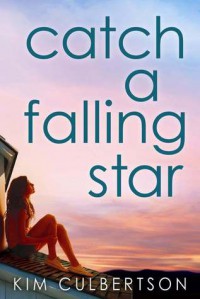A Star, A Moon and Stevie Nicks

Even Hobbits have to take adventures. That's how they bring back stories to the Shire.
I am flummoxed.
Baffled.
Bewitched, bothered and bewildered how this book managed to pull something off of me, a plot-twist of sorts in my reading habits. We often get disappointed and underwhelmed but it’s quite a rarity to start off with notes snarking on the cringe-inducing cliches only to end up halfway through not making notes at all and just paying attention. You start to take it seriously. You realize hey, this book has something to say outside the stale and recycled premise. The message was hardly original but I was taken aback that there was a message at all. One that came across with heartfelt sincerity despite the cheesy and unpolished delivery methods.
The small town of Little, California has been chosen as the location for the comeback propaganda movie (the ridiculously premised A Christmas Cheryl) of troubled young star Adam Jakes. In his efforts to charm the public and improve his image, he hires the plain and provincial Carter Moon to portray the real-life small-town girl he supposedly falls for while filming. In her desire to help her brother from the financial snaggles of his gambling problem, Carter agrees. And what follows is the extremely predictable trope of Adam being charmed by the simplicity of the small-town and Carter discovering the “real” person behind the entitled, troubled boy.
Except, despite that predictability, Culbertson did a brilliant job in communicating the depth of both Carter and Adam's characters.
The effort to paint Adam as a big star fell flat, coming across as a B-movie star filming a direct-to-DVD film instead of the blockbuster this story was trying to sell. He started off like a Reid Alexander-esque character who transitioned awkwardly into a somewhat bad-boy-gone-good, misunderstood hero who just happens to understand his job a little too well. For me, this could have been done in a more seamless manner (or not done at all, actually) but the end product did deserve some merit, even if I'm not particularly a Frankie Muniz fan. In terms of the romantic chemistry between him and Carter, it was either too reined in or it really just was close to nil making me hanker for a more believable ending than what this disappointingly dished. I find them more interesting as two young people trying to make sense of life in the context of their contrasting realities.
Surprisingly, my favorite aspect in this book is its Pollyanna heroine, Carter. She's seventeen going on forty, a self-confessed hick who gave up a dance scholarship in New York because she wants to stay in Little helping out in her family's diner, holding dance classes for octogenarians and keeping a stargazing blog. She doesn't have a facebook or know how movies are made. It really REALLY was so easy to hate her.
Dancing was hard work. But hard work was not ambition. Ambition was something else. And I didn't have it.
It's a tricky age, seventeen. You have the whole world at your feet, people urging you to follow your dreams, to take life by the balls. Not having an ambition will probably send your parents into an apoplexy. But the hardest thing, harder than making it out on your own, is distinguishing between what makes you happy and the people around you happy. And that's what made me fall in love with Carter, she portrays that conflict brilliantly. She's a girl-next-door caricature and it's a bit of a stretch to believe that her thought process as reflective of her age and upbringing but there's this exchange between her and her dad that reveals an unexpected layer in her character.
The writing felt a little off at certain points, sometimes it felt like characters were breaking the fourth wall getting carried away with the soapboxing about bigger issues. Those self-serving, pretentious kids posting photos in Facebook are doing the devil's work, yes but can we not thump the podium too often too hard?
This also read a little too young for me. It’s not one of those young adult books targeting an adult audience. But at the same time, I can imagine, with some effort, any person at any crossroad in their life connecting to the themes this was trying to drive across. In a poignant reminder sort of way rather than as a cautionary guide on navigating adulthood.
Here's the thing you need to know. Here's a hint from Grown-Up World. There's no right way. Not really. Just perspective. We choose whether we succeed or fail. We do. It's all our own spin on it. We create our own definition of success or failure. You can't hold yourself up to other people's versions of things. Not society's idea of things and not other people's. Your own.
Uncorrected proof provided by the publishers in exchange for an honest review. Quotes may not appear in the final edition.
 4
4








